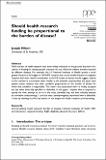Should health research funding be proportional to the burden of disease?
Abstract
Public funders of health research have been widely criticized on the grounds that their allocations of funding for disease-specific research do not reflect the relative burdens imposed by different diseases. For example, the US National Institutes of Health spends a much greater fraction of its budget on HIV/AIDS research and a much smaller fraction on migraine research than their relative contribution to the US burden of disease would suggest. Implicit in this criticism is a normative claim: Insofar as the scientific opportunities are equal, each patient merits research into their condition proportional to the burden of disease for which that condition is responsible. This claim—the proportional view—is widely accepted but has never been fully specified or defended. In this paper, I explain what is required to specify the view, attempt to do so in the most charitable way, and then critically evaluate its normative underpinnings. I conclude that a severity-weighted proportional view is defensible. I close by drawing out five key lessons of my analysis for health research priority-setting.
Citation
Millum , J 2023 , ' Should health research funding be proportional to the burden of disease? ' , Politics, Philosophy & Economics , vol. 22 , no. 1 , pp. 76-99 . https://doi.org/10.1177/1470594X221138729
Publication
Politics, Philosophy & Economics
Status
Peer reviewed
ISSN
1470-594XType
Journal article
Collections
Items in the St Andrews Research Repository are protected by copyright, with all rights reserved, unless otherwise indicated.

